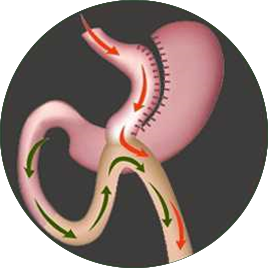
Table of Content
Who is the best candidate for Gastric Bypass surgery?What is the benefits of laparoscopy in Gastric Bypass surgery?
How many kilograms will I lose after Gastric Bypass?
What is after Gastric Bypass?
Will I feel pain after the surgery?
What should we eat after Gastric Bypass surgery?
12 Benefits for Gastric Bypass
Gastric Bypass. Is it a Redo surgery?
What is Gastric Bypass surgery?
It is one of the important bariatric surgeries. Where part of the stomach is cut off (pocket shape) and gastric bypass is made by passing the first part of the intestine. By decreasing the size of the stomach and bypassing the first portion of the intestine, weight loss occurs by decreasing amount of food eaten by the obese patient. Also decreasing the absorption of food and sugars. It is done by laparoscopy thorough 4 small surgical openings that do not exceed 2cm. Also, Hunger hormone (Ghrelin) is removed in the surgery which makes sense of hunger became rare after the surgery.
Who is the best candidate for Gastric Bypass surgery?
-The best candidate is the obese patient who likes eating large amounts of sweets and sugary food.
-Diabetic patient.
-A Patient who has an increase in weight than the ideal more than 30 kg or BMI (weight/(length in meter)2) more than 40 or 35 in the presence of chronic diseases as diabetes, increase in blood pressure or bones diseases.
What is the benefits of laparoscopy in Gastric Bypass surgery?
1-Less pain than open surgery.
2-stay in the hospital for only one day.
3-Short recovery period and the patient can return to his daily activities after 5 days at most.
4-The cosmetic look is much better.
How many kilograms will I lose after Gastric Bypass?
Laparoscopic Gastric Bypass achieves an excellent degree of weight loss, about 50-70% of excess weight in the first year after surgery.
What is after Gastric Bypass?
1-Stay in the hospital for only one day. And return to work after a week at most.
2-Vitamins and protein supplements intake prescribed by the doctor.
3-Continuous follow up with the doctor.
4-Commitment to healthy food and practising exercises to guarantee surgery results.
5-Avoid soda drinks to prevent the probability of stomach stretching.
Will I feel pain after the surgery?
According to patients testimonials who made gastric bypass with DR.Ahmed EL Masry, pain is not mentioned at all especially by using PCA.
Which is the most updated electronic analgesia device that delivers an accurate amount of analgesia to the body programmed by DR.Ahmed himself and is used by the patient for 3 days after the surgery to avoid any pain
What should we eat after Gastric Bypass surgery?
Fortunately, No deprivation of food at all after bariatric surgeries. The patient can eat all kinds of food but of course in small quantities due to the decrease in stomach size.
12 Benefits for Gastric Bypass:
1-Suitable for all kinds of obesity and all weights.
2-Stomach size is decreased to about 80% in the surgery, so the patient becomes full after small amounts of food.
3-Suitable for sweet eaters and patients craving for cakes and chocolates.As intestine bypass is made to decrease absorption of nutrients and sweets.
4-Part of stomach responsible for hunger hormone secretion (Ghrelin) is removed in the surgery. Which makes hunger sensation a rare one to the patient.
5-Offers the patient a cure from Diabetes type 2 due to decreasing sweets absorption.
6-Cures the patient from obesity complications as Hypertension and bones diseases.
7- A completely safe surgery.
8- Gives excellent results in the long run.
9- Done by laparoscope which offers the patient a lot of benefits.
10- Achieves a great weight loss compared with other procedures.
11- No foreign body enters the patient.
12- It is from the oldest bariatric surgeries and was experienced for a lot of years.
Gastric Bypass. Is it a Redo surgery?
Yes, it is. As part of stomach cut from it, is not removed outside the patient body.
*Patient submitted to Gastric bypass surgery shows a great weight loss, so the obese patient reaches the ideal weight in very few months and he must follow all doctors instructions regarding diet and vitamins intake especially in the first months following the surgery.
*Also the surgery rescues the obese patient from obesity complications as diabetes, high blood pressure, and bone diseases.
*Time of surgery is about one hour and the patient stays in the hospital for only one day.
Read more about:
Read in Arabic: تحويل المسار بالمنظار
Contact us
We are happy to support you. If you have any questions about bariatric surgery, the services we provide, or would like to schedule an appointment, please do not hesitate to contact us and we will respond as soon as possible. We are here to support you on your journey to a healthier life!

